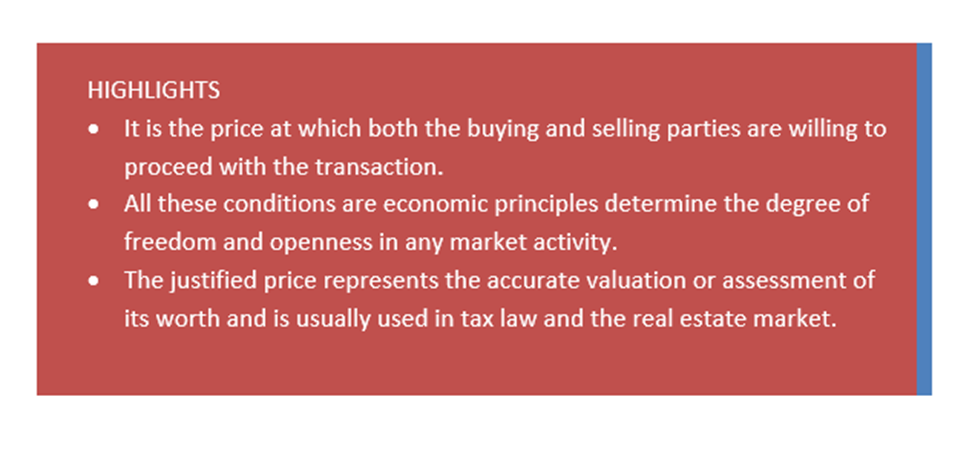What is Justified Price?
Justified Price is also known as fair price or fair market value is the price of any asset and security that would sell for on the open and competitive market where buyers and sellers have adequate information of reasonable time to complete a deal, both the parties should have knowledge of relevant facts, behaving in their own best interest and free of undue pressure to trade. Justified price is the price at which both buyer and sellers are willing to proceed with the transaction.
All these conditions are economic principles that affect the degree of flexibility and openness in any market activity. The justified price is different from market value that refers to the current price of an asset or securities in market.

Justified Price in details
Justified price is different from the similar terms such as appraised value or market value, as it takes free and open market principles into account, and it is more difficult to determine justified value. The term is often used in legal settings and is utilized in taxation.
The justified price indicates the accurate valuation or assessment of its worth that usually used in the real estate market and tax laws. It is also used in salary deals, business sales and others. Insurance firms usually use this method for claim payouts.
Significance of Fair Market Value
- Taxation
In taxation, the justified value is used to determine the property taxes to be paid by an owner, depending on the time the owner has owned the home. Tax reduction is also available on depreciation of assets and on casualty loss.
Another field of taxation where the justified value is used for tax purposes is charitable donation. Where the taxpayer may claim a tax credit for the justified value of the donation and in such circumstances the process of price discovery is known as appraisal.
- Legal Settings
The Justified value of an asset is used in case of divorce settlement or compensation payment due to damage to private property.
- Insurance
Justified value is often used by insurance firms when a claim is made on vehicle damage. The insurance firm uses justified value to cover the damage on the vehicle’s justified value not on the price at which the vehicle was brought.
Challenges in determining Justified Price
There is no particular method to determine justified price of an asset that is always best for all situations. For example, you may buy a land below the justified value from someone who was in urgent need of money and if later you decide to donate the land you may claim deduction above the buying price of the land.
Similarly, other assets are compared with recent sales of closely comparable assets. Using replacement cost needs accurately estimate costs and accounting depreciation and other factors and at last the appraiser’s estimate justified value is only as good as the completeness of the information available and the appraiser’s expertise.
In case, the government takes the private property and uses it for public use, the justified value is often not relevant as losing property is under compulsion. Determining justified value of unique items is also quite difficult as the there may be few or no comparisons and determining the value of business needs future forecast as today’s value may depend on the future cash flow for several years. Justified value is different from the market value or intrinsic value. Market value is the current asset price at which it can be purchased or sold. The justified value is more hypothetical and change of ownership and an actual sale is not always determined.
What is an Appraisal?
Appraisal is a process of valuation any asset such as business, property or good and is used to estimate the selling price of assets or to determine tax liabilities. There are various methods to determine the value of an asset such as risk analysis and comparing the market value of similar asset.
Overall valuation of the company’s assets and liabilities is different from the valuation of the one share of the company’s total stocks as it can be determined by averaging its highest and lowest selling price in a trading day. For private company the current value of a share is determined by comparing the valuation rations of private companies with public companies.
 Please wait processing your request...
Please wait processing your request...